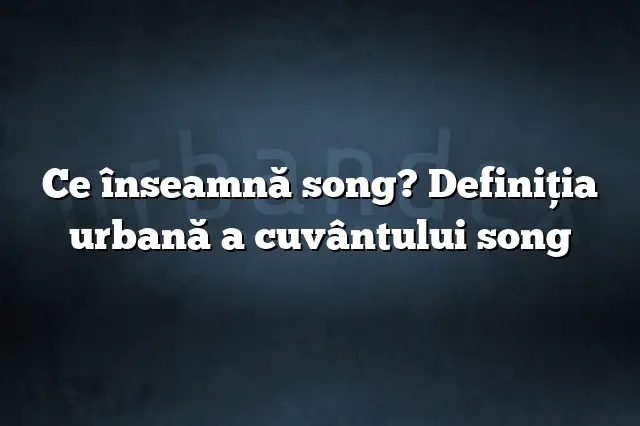Primul sens al cuvântului song
song
o melodie, o ritm, o melodie, o rimă, un cuvânt, o poveste, o sărbătoare, o rugăminte, un răspuns, o voce…
a cântat un cântec frumos.
Al 2-lea sens al cuvântului song
song
un fenomen intangibil și aproape supranatural care stimulează sufletul pe multiple planuri sub multe forme. Auzul este cel mai raportat simț afectat de un cântec. Se știe că auzirea unui cântec induce reacții din alte simțuri, cum ar fi atingerea, emoțiile și chiar vederea.
Acest cântec mă face să dansez!
Al 3-lea sens al cuvântului song
song
un vibe
Eu: Îmi plac cântecele
prieten: este o atmosferă
Al 4-lea sens al cuvântului song
song
O unitate de măsură a timpului sau a distanței.
barul este la trei cântece distanță cu mașina sau douăzeci de cântece pe jos
Al 5-lea sens al cuvântului song
song
A genre of entertainment to listen to.
Usually describing a situation through singing.
Most are about love or hate and usually ryme.
Al 6-lea sens al cuvântului song
song
Taiwanese for either being completely out of fashion or shallow, or both. Tacky.
Ni hao song la!
You’re so tacky/clueless/shallow!
Al 7-lea sens al cuvântului song
song
Also known as the Song of Solomon, a section of the Bible that is decidedly one of the most erotic, sensuous works of poetry that anybody can find.
It’s one of the „scrolls” (megillot) of the Writings (Ketuvim), the last section of the Hebrew Bible. It is also the fifth book of Wisdom in the Old Testament of the Christian Bible.
The whole structure and plot is that of a pair of lovers from courtship to marriage to consummation is a celebration of erotic love. While it can be argued that it’s a metaphor for the union between Yahweh and the land of Israel (or that between Christ and the Church), it’s just as likely very seductive romantic poetry.
The „Song of Songs” features such gems as these:
„…She:
Like an apple tree among the trees of the forest
is my beloved among the young men.
I delight to sit in his shade,
and his fruit is sweet to my taste.
Let him lead me to the banquet hall,
and let his banner over me be love.
Strengthen me with raisins,
refresh me with apples,
for I am faint with love…”
„He:
…How delightful is your love, my sister, my bride!
How much more pleasing is your love than wine,
and the fragrance of your perfume
more than any spice!
Your lips drop sweetness as the honeycomb, my bride;
milk and honey are under your tongue.
The fragrance of your garments
is like the fragrance of Lebanon.
You are a locked garden, my sister, my bride;
you are a spring enclosed, a sealed fountain…
She:
Awake, north wind,
and come, south wind!
Blow on my garden,
that its fragrance may spread everywhere.
Let my beloved come into his garden
and taste its choice fruits…”
„…He:
How beautiful your sandaled feet,
O prince’s daughter!
Your graceful legs are like jewels,
the work of an artist’s hands.
Your navel* is a rounded goblet
that never lacks blended wine.
Your waist is a mound of wheat
encircled by lilies.
Your breasts are like two fawns,
like twin fawns of a gazelle…”
*The „navel” translation is interesting since, in the original Hebrew, he seems to be describing her vulva.

